Today I bring you a very interesting project. Zentry is an ambitious and exciting project aimed at creating a "metagame layer". They are dedicated to turning everyday life into an epic MMORPG.
If you play games (PC, console, mobile, or web3 games), you definitely don't want to miss this article.
Zentry hopes to unify all your activities on different games (web2 and web3) and platforms, allowing you to play games and earn rewards through another metagame.
The team has achieved great success in the GuildFi track in the past and has received support from top investors (Binance, Animoca, Coinbase Ventures, Defiance Capital, etc.). Their treasury is worth as much as $150 million.
After reading this article, I will tell you how to start playing games and earning shards through their first product.
Today, I had the privilege of discussing their vision and the overall situation of web3 games with Jarindr, co-founder of Zentry.
This article is written in collaboration with Zentry, and I may continue to work with them in the future because I really like this vision. I hope to support as many high-quality blockchain consumer applications as possible.
1. First, can you briefly introduce GuildFi and why you decided to launch Zentry?
We founded GuildFi over three years ago. GuildFi is a gaming platform. If anyone is familiar with Axie Infinity, this game has created job opportunities for millions of people in Southeast Asia. Our headquarters are in Thailand, and we saw a huge market opportunity in Southeast Asia. That was about two and a half years ago.
At that time, Axie Infinity was one of the largest games, and in fact, it was the only game that introduced game guild narratives and scholarships. We created thousands of job positions for people to start playing games and earn rewards and income.
As a player with 10 years of gaming and business investment experience, I have seen the creation of many protocols. Given my engineering background, I know that the "play-to-earn" model is not truly sustainable. You can't just keep distributing tokens to speculators. This pyramid-like structure will eventually collapse.
This realization prompted us to transition from GuildFi to Zentry. The biggest reason for this transition is the change in narrative and business model. GuildFi focused on game guilds, but now we are building something on a larger scale with Zentry. The name GuildFi still signifies game guilds, and we are building something more ambitious and revolutionary, so rebranding is necessary to make people understand that Zentry is not just about games. We aim to fundamentally change this industry in a significant way.
2. What main problems does Zentry solve?
Through Zentry, we are building a "game of games". So, what problems are we trying to solve here? We are addressing the two biggest challenges in the gaming industry, not just in games, but in a broader industry. This includes both Web2 games and Web3 games, although I don't like to separate them.
The first problem is issuance, and the second is monetization. Gamification has always been an important part of consumer applications. If you are familiar with e-commerce applications or apps like Duolingo, you will know that gamification has always been a key element.
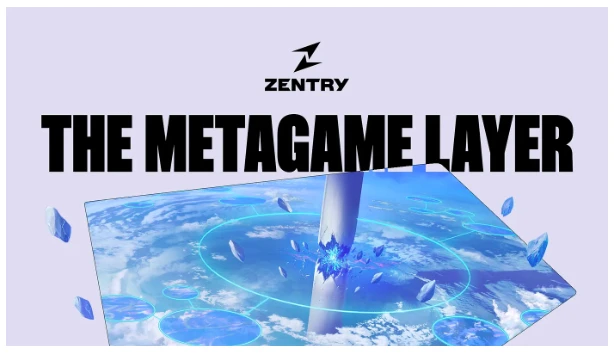
Looking at some of the largest consumer applications, such as TikTok or YouTube, you will find that they always enhance user engagement, attract them to revisit constantly, and enhance the overall experience through various gamification methods. This could be as simple as daily login rewards. If you understand Duolingo, one of its biggest features is continuous login check-ins, and some people have been logging in for 700 days. These are practical examples of how consumer applications use gamification to keep users coming back.
We are building a layer that covers consumer applications, which can be games, social networks, or any other platform. This layer helps these applications monetize better, improve user retention, and create real story backgrounds that make users truly willing to continue visiting.
Zentry is an ecosystem consisting of multiple interconnected products, all based on the same goal. Imagine it as a universe of interconnected games, with stories, intellectual property, and characters that people can immerse themselves in. To make progress in our game, you may need to do something outside the game and interact with different layers and applications.

Our layer helps these applications achieve better monetization and issuance. For example, if you frequently play games like "Dota," "League of Legends," or "Axie Infinity," each game has its own mini-games and achievements. Our layer adds another level of engagement. For example, every time you hit an opponent in "Valorant" or complete a game in "Axie Infinity," you may receive additional rewards from our layer.
These rewards may come from various resources in the Zentry universe. Playing different games can earn different resources, which can be used to create items, gift cards, or enhance profiles. This encourages players to return to their favorite games and helps these games achieve better monetization.
First-party issuers may not want to use mechanisms like timed loot boxes or gambling because users may think they just want to squeeze more money out of them. As a third party, we can apply these game mechanisms to different games without worrying about these issues, enhancing user experience and monetization capabilities without affecting people's views of the original game or application.
3. So, Zentry is a bit like the movie "Ready Player One," where everyone is playing a bunch of different games in a persistent universe. Can people understand Zentry in this way?
Absolutely. If you look at our daily lives, this kind of thing is already happening, just scattered everywhere. For example, if you have played "Dota" for 20,000 hours, that is very valuable. You are an important player for game issuers looking for experienced players. Suppose I am a new game developer and I want to contact people who have played mobile games for at least 10,000 hours to test my new game. This is a good example of why this is important and how you can eventually monetize your own data and skills.
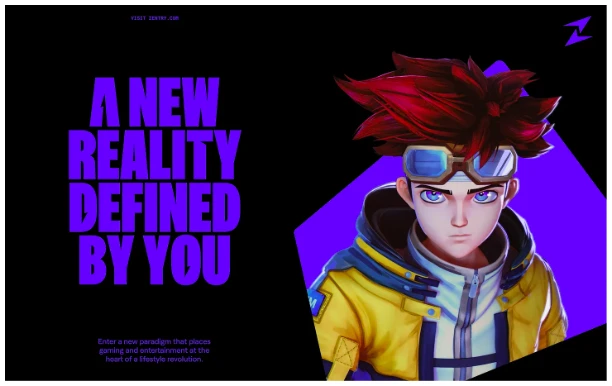
Zentry gives users more autonomy, helps players in Zentry grow and thrive, and makes their daily activities profitable. Unlike the unsustainable "play-to-earn" model (earning tokens by playing games), we have a more sustainable model.
This applies not only to the digital realm but also to the physical realm. Imagine that you want to create a rare sword in Zentry, which requires resources from different games. We will not force people to play different games because that is not practical. Users usually only play a small number of games. For example, if you want to create that sword and you need resources from game A, but you only play game B, we have designed a model where you can still create these resources because other players are playing game A.
Imagine if the last resource you need can only be found in a physical store. You can go to a new partner store, such as Dunkin Donuts, and be one of the first 500 customers. This creates a collaboration between the digital and physical spaces. Remember when Pokémon Go had rare Pokémon appear at specific locations, attracting large crowds to certain stores? We have the ability to create similar experiences in any field, from the digital world to the real world.
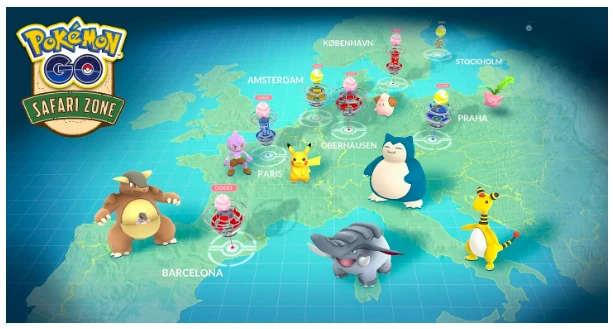
4. Zentry will launch a series of interconnected products, starting with Nexus. Can you introduce your product?
We start with Nexus, which has been live for a few weeks. We have already attracted over 100,000 users. Nexus gamifies social network interactions and builds games on top of it. We have created a social graph to identify powerful users in the Web3 ecosystem. What we offer is a gamified experience, not just a mining platform like other platforms, but a real game. Although the current version is more simplified and focused on direct interaction, our next upgrade will turn Nexus into a more complete game.
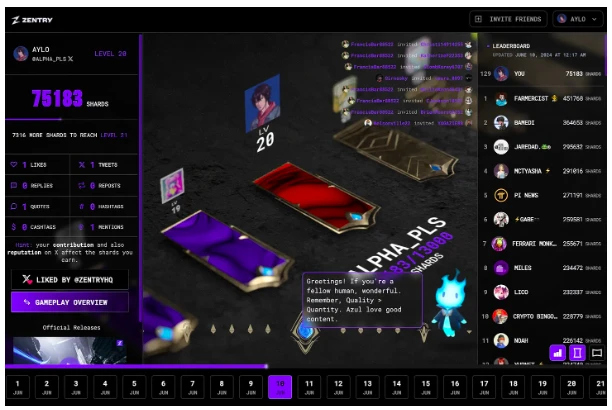
In the full version, every time you discuss different games on Twitter or earn resources, you can use these resources to create items and equip them to your profile, engage in PvP battles with other players, or create guilds. We aim to encourage a gamified experience that allows users to become content creators while playing games. We believe that Web3 lacks enough content creators, making the industry rely on a few influential individuals, streamers, and players. There is a significant gap in this aspect compared to Web2 games.
For example, hiring a YouTuber or streamer with 1 million subscribers to play your game may cost $5,000 to $7,000. However, hiring a similar Web3 influencer may cost five to six times more. Nexus aims to address this issue by gamifying content creation. We do not directly incentivize people to create content, but make it interesting through games, improving the way people interact with social networks.
The product we will launch in the third quarter is Radiant. Radiant is a game collection designed to enhance your daily gaming experience across different games (whether Web2 or Web3).
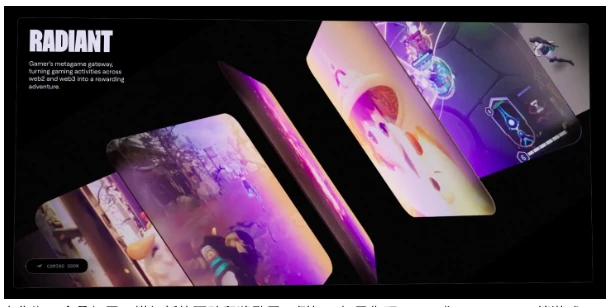
It serves as an overlay layer, adding new interactions and rewards. For example, if you play games like CSGO or Apex Legends, Radiant will introduce mechanisms similar to loot boxes into all the games you play. These loot boxes provide items and resources, encouraging players to engage more in their games. We aim to create a win-win situation for game issuers and players.
The third product to be launched is Zigma, our primary NFT collection. Although we have not revealed many details yet, Zigma will serve as the global passport for the entire Zentry ecosystem.
5. What do you think are the advantages of Zentry in the market?
Zentry is a layer that can run on top of thousands of existing games. If certain games fail, we will not fail with them. Our layer integrates into existing successful IPs and new games.
One of our biggest advantages is our team, which consists of seasoned professionals in Web3, advertising, ad tech, and the gaming industry. Additionally, we are one of the largest gaming ecosystems, with $150 million in funding. This enables us to incentivize and build the entire Zentry ecosystem and invest in games. The key is that Zentry itself will not fail because of the failure of a single game.
6. What role does the $ZENT token play in the Zentry ecosystem?
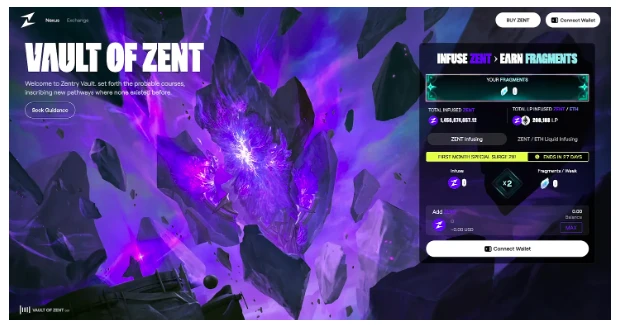
The Zentry token will play multiple roles in various areas and will be used in all our Web3 builds. First, Zentry is profitable, and the revenue we generate can be used to purchase and burn these tokens. These tokens will be the primary currency for all our products, including trading and sales. This applies to games, social networks, and all the layers we build. The Zentry token will be the only token used by all platforms and partners who wish to collaborate with us.
For example, if a game wants to join the Zentry universe, they need to use our token to pay us for managing the distribution of resources in their game. Also, when you stake Zentry tokens, you will have the opportunity to access multiple ecosystem areas, as we also invest in gaming, social finance, and artificial intelligence, among other areas.
We call it "staking rewards." When you stake, you will receive rewards that can be used to purchase tokens or earn additional tokens when participating in different games. For example, if you enjoy running and we invest in a running ecosystem, you can earn more tokens from that ecosystem. We aim to distribute the right tokens to the right people to maximize the likelihood of their reuse in the ecosystem.
7. What are your views on the current Web3 gaming industry?
I think we have all experienced the evolution of Web3 games through different cycles. From the beginning, if you remember 2017, people were already discussing how to integrate games with blockchain, although the concept was not fully developed at the time. Now, almost six or seven years later, we have gone from initial distrust or disbelief in Web3 games to having real participants and high-quality developers entering the field. These newcomers are trying to create dreams that cannot be achieved in Web2.
If we look at the current state of Web3 game users, I would say we are still in the early stages, but the potential is enormous. No other industry can attract millions of users like games. People are still trying to build games on the blockchain, but they have not fully understood the unique advantages offered by blockchain technology.
For example, the traditional game industry uses Kickstarter for fundraising, a practice that differs from Web3. In Web3, people invest in your company from the beginning and stay with you as your game develops. We need more high-quality developers from the creative industry who understand both traditional games and Web3.
Major companies like Ubisoft are trying to enter this field, but they often fail because they do not understand Web3 culture. Similarly, some Web3 game studios do not know how to create engaging games. However, we have seen those who can make progress in both Web3 and Web2.
We are still waiting for a fully successful Web3 game. Competing with giants like PlayStation with huge budgets is challenging. Blockchain provides a unique way to distribute games and acquire users, which is impossible in traditional games.
For example, Mavia launched an event on the Apple Store, using token airdrops to incentivize downloads. This strategy helps acquire users who become loyal fans because they can spend the tokens earned in the game.
We are still in the exploration stage. Many Web2 studios are exploring Web3 because it offers new ways to attract and incentivize users. We just need a successful game to showcase the power of blockchain in games and help people understand its enormous potential in user acquisition and engagement.
8. Are there any games that you think might be very successful at the moment?
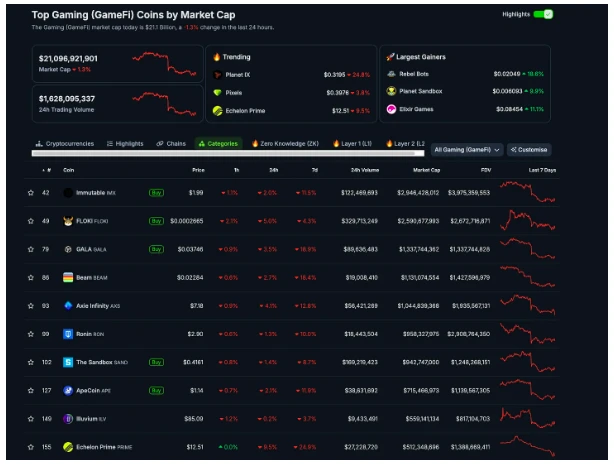
To be honest, I am quite pessimistic about AAA games. AAA games require a lot of time and a huge budget for development, as well as the expertise to create high-quality games. In contrast, I am more interested in indie games that require less time, are well-designed, and have the right incentive measures.
For example, "Pixels" is a simple game, similar to the farm simulator "FarmVille," which will gradually develop into an RPG game. It has a large user base, possibly including a mix of humans and bots. This example demonstrates the powerful role of incentive measures in attracting users to start playing games. Of course, whether this is sustainable is another question that everyone is trying to solve.
If asked to point out a sustainable model, I cannot give a definite answer, as this is still an evolving field. However, I believe games on Ronin have a good user base because they are familiar with blockchain and gaming. The success of "Axie Infinity" on Ronin indicates that a loyal user base is ready to use wallets for gaming.
Ronin has attracted millions of users in Southeast Asia through the use of incentive measures. If someone can replicate this success, I think some indie games that rely on Ronin can serve as good examples.
I am also excited about Parallel and the project they are building.
免责声明:本文章仅代表作者个人观点,不代表本平台的立场和观点。本文章仅供信息分享,不构成对任何人的任何投资建议。用户与作者之间的任何争议,与本平台无关。如网页中刊载的文章或图片涉及侵权,请提供相关的权利证明和身份证明发送邮件到support@aicoin.com,本平台相关工作人员将会进行核查。



